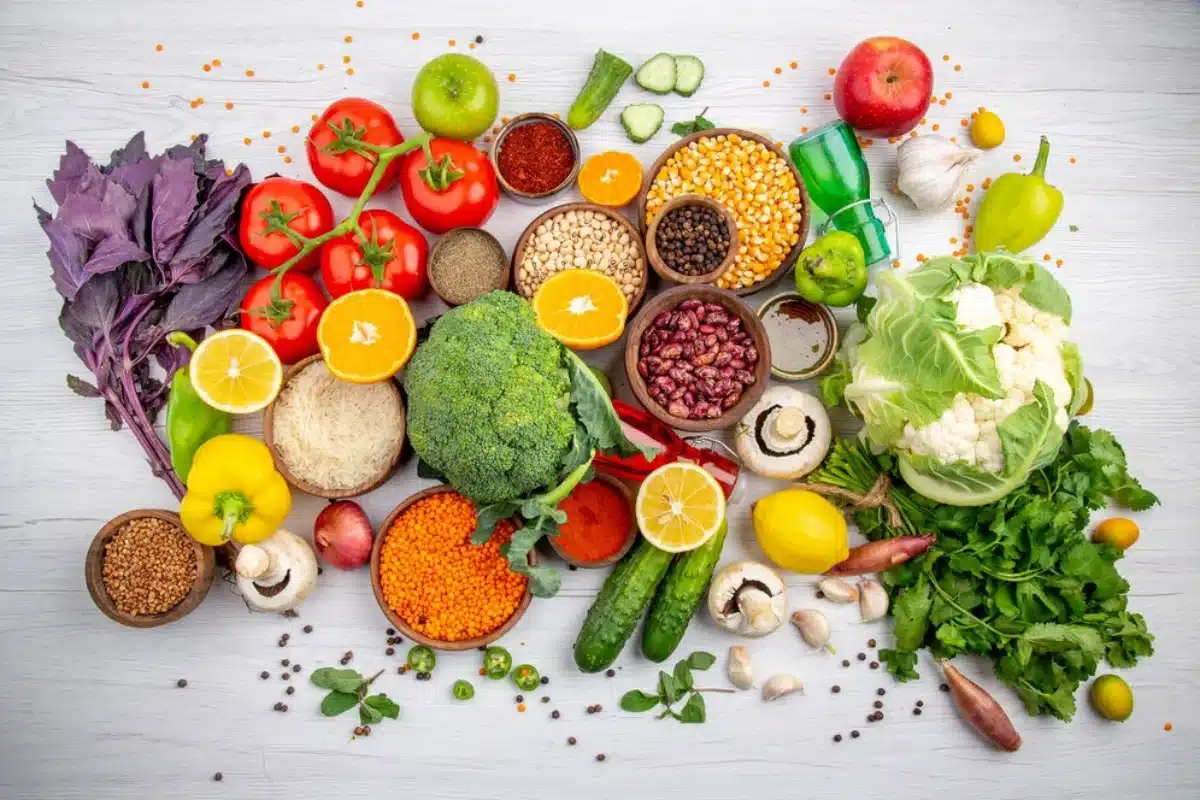
The Health Benefits of Eating Organic Food
Currently, organic food is trending a lot. Health and environmental concerns are driving more people to buy organic produce. But why is eating organic food a healthier choice? Is something potentially more nutritious, or is it merely the trend?
In this guide, we will look at the organic food benefits. We’ll tackle questions about why you eat organic, how organic food differs from conventional food and what organic produce is best for your diet. Whether you’re looking to improve your health, reduce your exposure to harmful chemicals, or promote sustainable farming, knowing the perks of organic food helps you make better choices, and knowing organic food benefits enables you to make better choices.

What is Organic Food?
Organic food is grown without synthetic pesticides, fertilisers, GMOs, or artificial additives. Organic farming focuses on sustainable practices, biodiversity, and soil health. This makes it a friendlier option for the environment.
Food must meet strict guidelines from regulatory bodies like the Soil Association (UK) or the USDA Organic Certification (USA) to be certified organic. These rules ensure that organic food is produced ethically and sustainably, benefiting our health and the planet.

Key Benefits of Eating Organic Food
1. Higher Nutritional Value
Studies suggest organic food may have more nutrients than conventionally grown food.
- More antioxidants: Organic fruits and vegetables can have up to 69% more antioxidants, which help reduce the risk of chronic diseases.
- Higher omega-3s: Organic dairy and meat often contain more omega-3 fatty acids, which are essential for heart and brain health.
- Better mineral content: Organic crops usually have more essential minerals like magnesium, iron, and zinc because of healthier soil.
2. Reduced Exposure to Harmful Chemicals
One of the most significant benefits of organic food is the lack of harmful pesticides, herbicides, and synthetic fertilisers. Conventional farming often uses chemicals that can leave residues on food, potentially affecting health over time.
- Lower pesticide residues: Organic foods have fewer pesticide residues than conventionally grown foods.
- No artificial additives: Organic food is free from synthetic preservatives, colours, and flavour enhancers typical in processed foods.
- Reduced antibiotic exposure: Organic meat and dairy come from animals raised without routine antibiotics or synthetic hormones, lowering antibiotic resistance risks.
3. Supports Environmental Sustainability
Organic farming promotes eco-friendly agricultural practices that protect the environment and natural resources.
- Better soil health: Organic farming methods improve soil fertility, reduce erosion, and boost biodiversity.
- Less water pollution: Avoiding synthetic pesticides and fertilisers helps clean local water supplies.
- Lower carbon footprint: Organic farming usually uses 30-50% less energy than conventional farming, making it a more sustainable choice.
4. Improved Animal Welfare
Organic livestock farming follows strict welfare standards to ensure the humane treatment of animals.
- Free-range living conditions: Organic animals are raised in free-range environments, allowing them to roam and act naturally.
- No growth hormones or antibiotics: Organic meat and dairy come from animals raised without growth hormones or routine antibiotics.
- Healthier and more ethical meat products: Organic livestock eat natural, non-GMO diets, improving meat and dairy quality.
5. Better Taste and Quality
Many believe organic food tastes better due to the absence of synthetic chemicals and improved soil quality.
- Richer flavour: Organic fruits and vegetables often have a more intense, natural taste.
- Better texture and freshness: Organic produce is usually grown locally and sold quickly, producing fresher, higher-quality food.

The Best Organic Produce to Buy
Switching to an entirely organic diet can be expensive. However, prioritising certain foods can still offer significant benefits. Here are some of the best organic produce choices for your diet:
1. Organic Fruits and Vegetables
Some fruits and vegetables have higher pesticide residues when grown conventionally, so they should be a priority for organic purchasing. These include:
- Strawberries
- Spinach
- Apples
- Grapes
- Tomatoes
- Celery
If you’re on a budget, choose organic for these high-residue foods while selecting conventionally grown low-pesticide options like avocados, pineapples, and onions.
2. Organic Dairy and Meat
If you consume animal products, picking organic meat and dairy can reduce exposure to antibiotics and synthetic hormones. Look for:
- Organic milk and cheese
- Grass-fed organic beef
- Free-range organic eggs
- Pasture-raised organic poultry
3. Organic Grains and Legumes
Organic whole grains and legumes are grown without synthetic pesticides, keeping their natural nutrients. Top choices include:
- Organic oats
- Brown rice
- Quinoa
- Lentils and chickpeas
4. Organic Coffee and Tea
Many conventional coffee and tea crops are heavily treated with pesticides. Choosing organic ensures your daily cup is free from harmful chemicals.
- Organic coffee (fair trade certified)
- Organic green and black tea
Addressing Common Myths About Organic Food
#1: Organic Food is No Healthier than Conventional Food
Some studies show minimal differences, but research suggests higher antioxidant levels and better omega-3 content in organic food, offering extra health perks.
#2: Organic Food is Too Expensive
While organic food costs more, focusing on key items (like organic dairy, meat, and high-residue produce) can make a big difference without breaking the bank.
#3: Organic Farming Can’t Feed the World
Even if organic farming yields can be lower, sustainable farming techniques and less food waste can help meet global food demands while reducing environmental damage.
How to Incorporate Organic Food into Your Diet on a Budget
- Buy in Bulk: Purchase more significant amounts of organic grains, legumes, and nuts to save money.
- Shop at Farmers’ Markets: Local farmers often offer cheaper organic produce than supermarkets.
- Look for Store Brands: Many supermarkets have affordable organic product lines.
- Grow Your Own: Start a small herb or vegetable garden for fresh organic produce at home.
- Prioritise Key Organic Items: Focus on high-residue produce, dairy, and meat while buying other foods conventionally.
Eat Organic.
Organic not only is beneficial for health; it is better for the ecosystem and animal welfare. Opting for organic produce most of the time can have profound benefits for your health, reduce your exposure to the chemicals likely found in some crops, and help promote sustainable farming and good nutrition.
Going fully organic may not be feasible for everyone, but a few targeted, intelligent changes — like committing to buy organic versions of highly audited foods — can go a long way; see the results here.
What do you think about eating organic? Share your experiences in the comments below!


